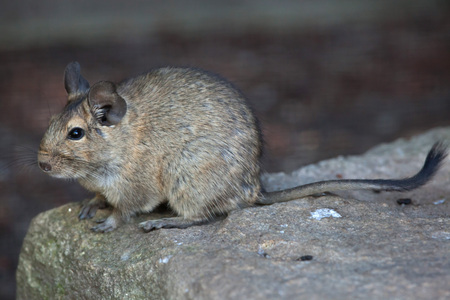Caring for Your New Pet Degu
October 06, 2017
From hedgehogs, pet rats, to sugar gliders, it’s becoming far more common to hear about everyday folks adopting smaller, unusual animals as pets. With enough research and dedication to the animal’s care, most people can jump onto this trend if willing to put the work in. No one wants to bear the stigma of abandoning their pet when the going got tough, such as the many pet owners who reportedly adopted Siberian huskies after watching “Game of Thrones." For those who might be interested in degus – rodents about the size of guinea pigs – understanding the animal backwards and forwards is necessary, and hopefully this guide can help do just that.
General Description
Also called Octodon degu, common degu, or brush-tailed rat, degus typically live between five and eight years though some have reportedly lived to be ten years old. They are also commonly between five and seven inches long, with their tails adding five or six more inches to their overall length. As for color, a degu’s coat has an assortment of black, brown, and yellow hues, with a creamy-yellow color on its belly.
Behavior
Luckily, for pet owners, degus are especially social animals who can become quite tame if handled from a young age—just, as is expected of rodent owners, don’t lift them by their tails. They also do well in captivity when surrounded by other degus due to their especially social nature, being curious and playful with social interaction and neurotic or aggressive without it. They are also, unlike most rodents, diurnal and therefore active in the daytime. Finally, like prairie dogs, wild degus live in communities and dig elaborate systems of burrows for making their homes.
Housing
Because their nature calls for digging burrows, degus must be housed in large cages. For two degus, a cage must be 24 in. by 18 in. by 24 in. tall at least, but a larger cage is better, with large multilevel cages like those made for chinchillas or ferrets being ideal. Being avid chewers, degus require a wire cage (or they’ll chew clean through plastic or wood), but the floor should be solid, as should ledges and shelves because degus are susceptible to foot issues like bumblefoot.
Just as with other smaller animals, pet owners should avoid pine or cedar shavings as bedding, instead opting for paper-based bedding. Also, a nesting box is essential for providing degus with a sense of safety while in the cage—a wood box, roughly six in. by eight in. by six in., should be appropriate, especially if there’s a flat roof for the degus to sit on. The box should have nesting material—tissues, shredded paper, hay—as well.
Additionally, degus should be provided with a solid surface exercise wheel, with an 11-inch diameter being a suitable size. Thick branches for chewing and climbing are a good idea (have some Manuka honey ready in case any injuries result), as are thick cotton ropes. Water bottles with sipper tubes are options for accessible water, but a chew guard may be required for it. Most importantly, degus must be provided with many opportunities for chewing to keep their teeth length in check, so always have rodent chew toys and wood blocks available.
Bathing
As with chinchillas, degus require routine dust baths to keep their coat and skin in good shape, so provide them with a shallow bowl carrying about two inches of chinchilla bath dust at least twice per week, leaving it for about 30 minutes or so to provide enough time for the degus to roll.
Diet
As rodents, degus eat diets low on carbs and high on roughage, so a good degu diet should combine rodent blocks with quality guinea pig or chinchilla pellets. Grass hay should always be available, and small amounts of alfalfa can be offered as well. Some fresh vegetables can be provided too, such as carrots, broccoli, green beans, leafy greens like spinach, kale, or parsley, uncooked and peeled sweet potato, and dandelion leaves (if pesticide-free and only in smaller quantities). Vegetables in the cabbage family (broccoli, cabbage, kale, Brussel sprouts, etc.) should be offered only in extremely small quantities, with a few degu experts recommending they be avoided altogether.
Pet owners should also avoid fruits, including raisins, as treats, instead going with peanuts, relish seeds, and whole nuts in the shell but only on occasion due to high fat content. Pet owners must take care that their degus don’t become overweight by keeping sugary food to a minimum, as they’re prone to diabetes.
Copyright: wrangel / 123RF Stock Photo


.jpg)



